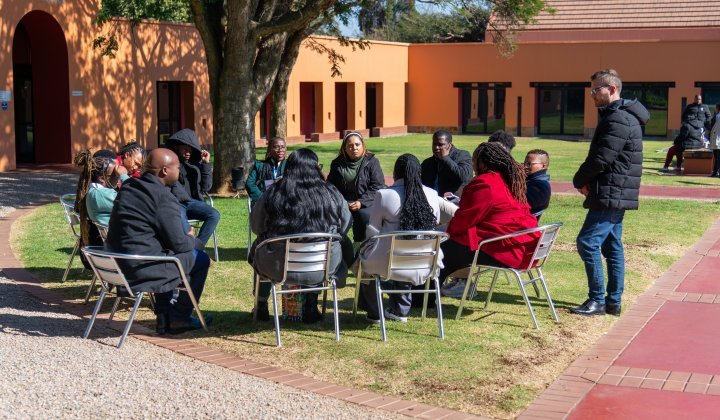The advertising and marketing sector has a reputation for creativity, innovation and glamour, but also for untrustworthiness and spin. A new generation of marketing leaders is focused on changing this by delivering business results, leveraging the power of technology, and improving leadership and transparency in the industry.
Out with the old
Musa Kalenga, GIBS MBA alumnus and CEO of Brave Group, an integrated advertising agency group, is working to build a “shared value creative enterprise” – a process he documents in his upcoming book, The Brave Code: Pioneering a Shared Value Creative Enterprise. Upending traditional advertising models, challenging assumptions around equity, and pushing back at outdated and unhealthy client and agency practices, Kalenga seeks to create a model that can be replicated – not only by other agencies, but by organisations outside of the industry too.
He says leadership is the practice, art and science of energising people in a particular direction, or to achieve a particular thing. “Energy is energy,” he says. “You can never destroy it; it can only move from one phase to another. As a leader, you have to understand how to harness that energy. In so doing, you can direct people in a way that they can achieve things together. An effective leader is therefore someone who is very mindful of how their energy impacts how people behave and how they show up.”
He says one of the major challenges in the advertising and marketing sector in South Africa is the same as in many others – lagging behind in real transformation, diversity, and inclusion. Every leader in the industry needs to be aware of this context. “If you’re not mindful and aware of that, you’re largely going to perpetuate the challenges that we've experienced,” he says. “Beyond that, leadership in advertising and marketing is really about realising we are an existential crisis with regards to technology.”
Generative AI tools such as ChatGPT, DALL-E and Midjourney are disrupting the creative process. “Leaders need to look at how to start using that as another tool in the creative toolbox, as opposed to thinking about it as the enemy,” says Kalenga. “It's almost like going from having a butter knife to having a sword.”
The sector is also affected by the global economic landscape and, in South Africa, by local macro-economic and socio-economic nuances at play. “We can’t look for growth in the places we used to find it – we need to figure out where we’ll find growth in the future,” says Kalenga. “As a marketer and a technologist, I see technology being one of those places. As businesses are looking for more value for less cost, we have to find ways of producing multiples at fractions of the cost. Only the intersection of technology and creativity is going to enable us to be competitive.”
Kalenga says older generations of marketers need to rely on younger ones to navigate new technologies and ways of working, while younger generations need to acknowledge there’s much to be learned from those who have gone before them.
“That intersection point around the generational gap is how we’re going to solve for growing young leaders,” he says. “Every agency should have a plan and a programme of this nature and be deliberate about implementing it and being accountable for it.”
Embracing constant change
Sarika Modi, CEO of Triple Eight, an award-winning women-empowered integrated marketing agency, says the key to successful leadership in the marketing sector is a willingness to embrace change, to consistently evolve and adapt, and to support young people in doing the same.
“For example, the rise of ChatGPT has initially been met with fear in our industry, especially by many junior marketing professionals, who worry it will replace them,” she says. “As leaders, we need to support them in shifting perspective and give them comfort by finding ways to use the technology to enhance what we do and leveraging it for our clients’ benefit. It’s our job to set that example.”
Modi believes the role of numbers in marketing is often underestimated, whether it comes to delivering business value or meeting ESG targets. Her background is in actuarial science, and she says numeracy remains an underrated skill in marketing.
“Marketing is a key business function, but there’s traditionally been a lack of focus on the numbers,” she says. “It’s not enough to say you’ve run a great campaign; you have to be able to demonstrate value in the numbers. That holds agencies accountable and allows us to make changes during a project if we see we’re not on track to hit KPIs. As agencies, the numbers also help us to guide our clients about what will be effective and what won’t, and to give them comfort and control over how they manage their marketing spend.”
As the business landscape has shifted to recognise the impact that companies have beyond profit alone, and also on people and the planet (the triple bottom line), Modi says there’s been a move towards “purpose-led marketing”. However, in many instances, this has been misunderstood. Brand purpose – which is about creating a positive effect on society – has been rolled into corporate social investment (CSI) or charity campaigns.
“Purpose is much bigger than CSI and should help to drive business objectives,” says Modi. She says this confusion has resulted in purpose becoming “a dirty word” in the industry.
“Effective marketing is about doing both – meeting business targets and having a positive effect in society. There doesn’t have to be compromise. A strong brand embedded with good values can drive a strong profit motive through effective marketing campaigns.”
A new breed of CMO
Dr. Mzamo Masito, GIBS advisory board member and chief marketing officer (CMO) of Google Africa, says effective leaders lift themselves first – doing the work of self-awareness, self-education, self-esteem and continuous self-development – and at the same time they are aware of their limitations, understanding that they don’t have all the answers. They are also obsessed with uplifting others.
“As you’re lifting others, it shouldn’t mean that you aren’t also willing to pain them if necessary,” he says. “To be a leader, you must not have a need to be liked, but to be effective. You need the ability to get things done and to deliver amazing work.”
Effective leaders also need to be able to hold two truths simultaneously. “Someone can be good and bad,” Masito says. “Human beings are complicated, complex and more grey than black or white.”
Like Kalenga, Masito says marketing leaders should live at the intersection of art and science.
“There was a time when marketing was high in the clouds, but now you need to embrace social sciences and hard sciences and have a multidisciplinary approach. What is not measured cannot be managed, so we need to understand ROI and the value of data without becoming slaves to it. CMOs these days tend to be at the mercy of CEO and CFOs, who are often accountants or engineers. They only respect numbers; they don’t respect magic, intuition and gut. Modern marketeers, on the other hand, are not afraid to embrace behavioural science, psychology, and art, which can be subjective. They understand that not everything that can be counted counts.”
As Africa looks to develop a new generation of marketing leaders, Masito says there’s a need for industry to partner with tertiary education institutions and sectoral bodies to revise curricula to ensure they remain relevant and become more inter- and multi-disciplinary. He believes GIBS has an important role to play in this regard. He adds there’s also room to learn from Latin America and Asia Pacific, which share similarities with many African markets.
“We must not have an inferiority complex in Africa,” he says. “We’ve done great work that has gone global, including in our music and art sectors. For example, we’ve taken amapiano to the world. We should adopt what others are doing with pride, adapt it to our own cultures, and be obsessed with inventing things ourselves and taking them to the rest of the world. Importantly, we should embrace our diversity. We are not leveraging it. We need to realise that diversity goes beyond race and gender and to be more proactive in making sure that our marketing is representative of all consumers.”
Masito says CMOs also need to develop greater presence in boardrooms. “When I go into a board meeting, I make sure I’ve read the board pack and reviewed the financials. I come prepared with pertinent questions and solutions, even outside my discipline,” he says. “Every other discipline will always have an opinion on marketing or HR. For some reason, everyone thinks they can do a better job at those. So, CMOs have to be ready with the numbers and facts about our own disciplines, but why shouldn’t we have an opinion on other disciplines too? We have a role to play in helping the rest of the C-suite to be better storytellers, which is often something they’re not very good at. We can support CFOs in announcing results in a way that’s not boring. We are underutilised in the boardroom and we should change that. We must believe that we belong at the table and show the value we add by being there.”
Get the most out of your marketing
Practical pointers for organisations looking to unlock value through marketing:
- Embrace emerging technologies and the ways they can enhance your marketing approach.
- Leverage the specialist skills available through the gig economy by bringing freelancers and consultants on board for specific initiatives or purposes.
- Commit to diversity and inclusion and look beyond race and gender to sexuality, culture, ability, language, etc. A diversity of perspectives not only unlocks creativity, but protects brands from unwitting biases.
- Elevate the role of CMO in the boardroom and leverage the storytelling skills that marketers possess in other areas of the business.
- Develop strong marketing measurement models and dashboards, and use these to track and improve marketing performance.








